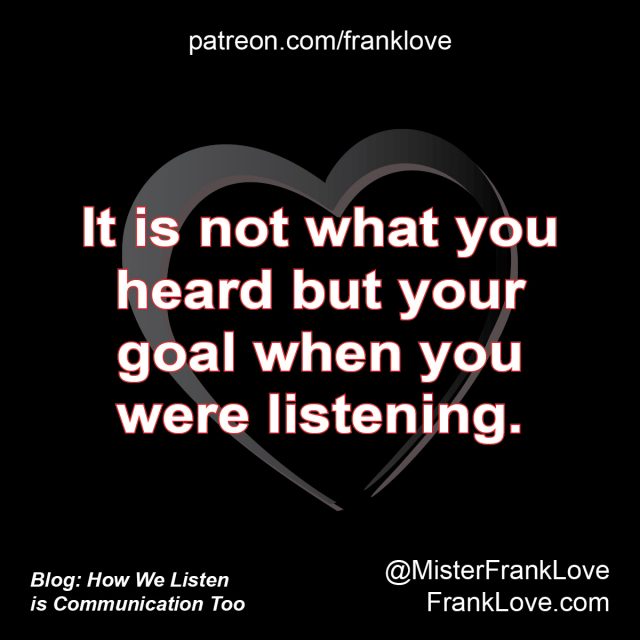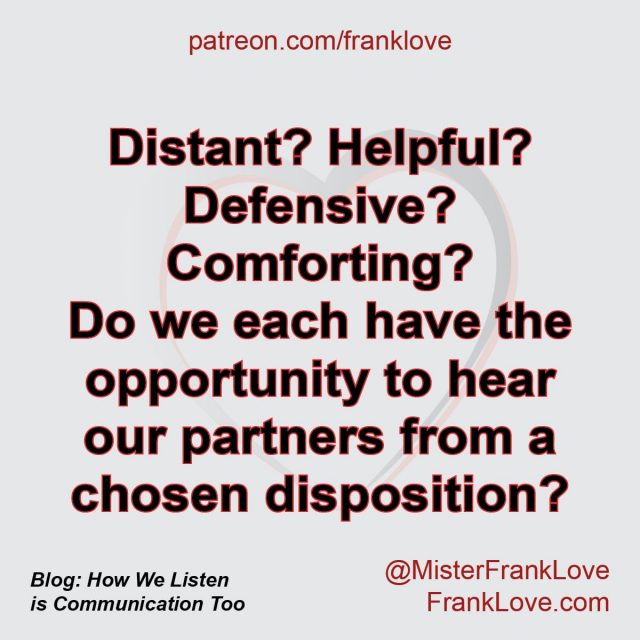 In my previous blog, “Discussing vs Arguing — What’s the Difference?” I wrote about the importance of knowing the difference between discussing and arguing in a loving relationship. which feeds into this week’s blog about another valuable communication skill — listening.
In my previous blog, “Discussing vs Arguing — What’s the Difference?” I wrote about the importance of knowing the difference between discussing and arguing in a loving relationship. which feeds into this week’s blog about another valuable communication skill — listening.
If the intent is to be heard, talking to someone who cannot hear is ineffective communication. If the intent is to be seen, using sign language with someone who cannot see is pointless.
We have all probably heard the wisdom, “It is not what you say but how you say it.” There is certainly a great deal of truth in that statement. Unfortunately, it is incomplete. Another communication insight that is worth considering is, “It is not what you heard but your goal when you were listening.”
Comparing Ineffective and Effective Communication
Here are some examples of communication, some that work and some that do not work:
- Example 1.
River: I don’t feel like myself today. I’m not sure what’s going on, but my equilibrium is off. - Jordan: I don’t know either. But whatever it is, don’t bring it over here. I’ve got enough problems already.
- Jordan (and Jordan’s response) may be perceived as distant.
- Example 2.
Kenyatta: I don’t feel like myself today. I’m not sure what’s going on, but my equilibrium is off. - Jackie: Don’t blame me. I just got home.
- Jackie (and Jackie’s response) may be perceived as defensive.
- Example 3.
Parker: I don’t feel like myself today. I’m not sure what’s going on, but my equilibrium is off. - Sage: Is it ok if I give you a hug?
- Sage (and Sage’s response) may be perceived as comforting.
- Example 4.
Bailey: I don’t feel like myself today. I’m not sure what’s going on, but my equilibrium is off. - Cassidy: Is there a way that I can lighten your load?
- Cassidy (and Cassidy’s response) may be perceived as helpful.
The initial statement in all four of these examples is exactly the same. Yet, each of the responses are very different. Admittedly, each of these couples may have a long and complicated history that preceded their conversation. But all things being equal (and they rarely are), one of the variables that had a significant effect on the outcome of each dialogue was how the respondent answered.
Which of the responses would we like to hear when we are feeling dreary on a given day? I’m going with the last two.
Listening Is Loving
Offering and even giving a hug isn’t always a response that is helpful. But it certainly can be. Sage’s comforting response was one that demonstrated an interest and care for Parker. And it is probably just along the lines of what Parker wanted to hear after noting an off-feeling.
And just as offering and being willing to help may or not be well-received, it is probably well within the realm of what Bailey wanted to hear and experience from Cassidy. The gesture of helpfulness was a demonstration of a healthy interest and care.
Which of the responses are we likely to give when we are feeling off on a given day? I have probably given all four responses at one time or another. But since I am clear about my preference for the last two, the two responses that I believe to be most loving, I am also clear that I have a responsibility to give those to my partner. She certainly deserves a loving response as much as I do.
The Importance of Good Listening
If we are reminding and educating one another on the fundamentals of high-level communication and we are only focusing on how we speak to our partners, we miss another part of the accountability—how we listen. The way that we listen is important.
Have you ever found yourself in the middle of a discussion or argument, and while the other person is talking you are thinking about what you are going to say next? I have. I have interrupted others while they were talking. I have grimaced at what they said. I have gotten up and walked around, and even walked away while others were talking. There may be times when this is appropriate, particularly when whoever is talking to us seems to be attempting to berate or harm us. However, it does reflect my receptiveness and to what degree I may be listening.
We have already discussed the destructive nature of dismissiveness. Dismissiveness communicates that we do not care about our partner or what they are saying.
Choose To Be an Effective Listener
 When listening to our partners are we distant (unloving), defensive (unloving), comforting (loving), helpful (loving) or something else? Each of us has the opportunity to hear our partners from a chosen disposition, if we choose to do so. We can also make no choice about our listening disposition. We can make it contingent on the music that we are listening to, the movie that we just watched, the person that we were previously interacting with, or something else outside of ourselves.
When listening to our partners are we distant (unloving), defensive (unloving), comforting (loving), helpful (loving) or something else? Each of us has the opportunity to hear our partners from a chosen disposition, if we choose to do so. We can also make no choice about our listening disposition. We can make it contingent on the music that we are listening to, the movie that we just watched, the person that we were previously interacting with, or something else outside of ourselves.
Let’s make a choice based on how we wish to hear and digest what our partners say and share with us in each moment. Let’s also make it dependent on how we want our partners to feel while and after interacting with us.
I hope that the choice will be loving.
Keep Rising,
Frank Love
In my next blog post, “Why Is It Important to Know if I Am Arguing or Not,” I continue our focus on communication, examining the important differences between discussion and arguing in a loving relationship.
Watch Frank Love’s presentation “The Act of Caring.”
Subscribe to receive Frank’s weekly blog.
Become a sponsor of Frank Love and his work creating loving cultures in our relationships with a monthly contribution of as little as $2. Sign up today at Patreon.com/FrankLove.
–—–—–—–—–—–—–—–—–—–—–—–—–—–—–—–—––
Each week, Frank Love hosts Zoom support group meetings that assist women and men as we work to create a loving culture in
our relationships. Calls occur from 7 p.m. to 8:30 p.m. EST and can be accessed by visiting FrankWeeklyCall.com.
- Tuesdays—Black Women: Creating a Loving Culture in Our Relationships
- Thursdays—Black Men: Creating a Loving Culture in Our Relationships
–—–—–—–—–—–—–—–—–—–—–—–—–—–—–—–—– –
Frank Love coaches individuals toward creating a loving culture in their family. He is also the author of Relationship Conversations You Don’t Want to Have (But Should Anyway) and 25 Ways to Be Loving. To schedule a free consultation, contact Frank at Frank@FrankLove.com.
Key Word Phrases
Is listening important? Is there a right way to listen? How can I be a good listener? How can I do a better job listening to my husband? 5.How can I do a better job listening to my wife? How can I do a better job listening to my girlfriend? How can I do a better job listening to my boyfriend? How can I do a better job listening to my partner? How can I do a better job listening to my mate? Effective communication Intent in communication Nonverbal communication Communication insight Listening goals Destructive communication Active listening Communication examples Perceived distance Defensive communication Comforting responses Helpful communication Communication variables Relationship dialogue Partner responsiveness Communication outcomes Healthy interest and care Emotional support Understanding emotions Loving responses Accountability in communication High-level communication Importance of listening Mindful listening Thoughtful responses Accountability in relationships Partner connection Receptive communication Choosing to listen Dispositional listening Distant communication Defensive responses Compassionate communication Responsiveness in dialogue Empathetic listening Effective listening skills Partner interactions Connection in relationships Love in communication Empathy in relationships Understanding partners Dialogue outcomes Relationship dynamics Emotional receptiveness Building connection Reflective listening Mindful communication Unspoken communication Positive dialogue Loving expressions Supportive communication Relationship well-being Dialogue effectiveness Communicating love Emotional availability Caring responses Positive listening Thoughtful dialogues Communication choices Loving interactions

